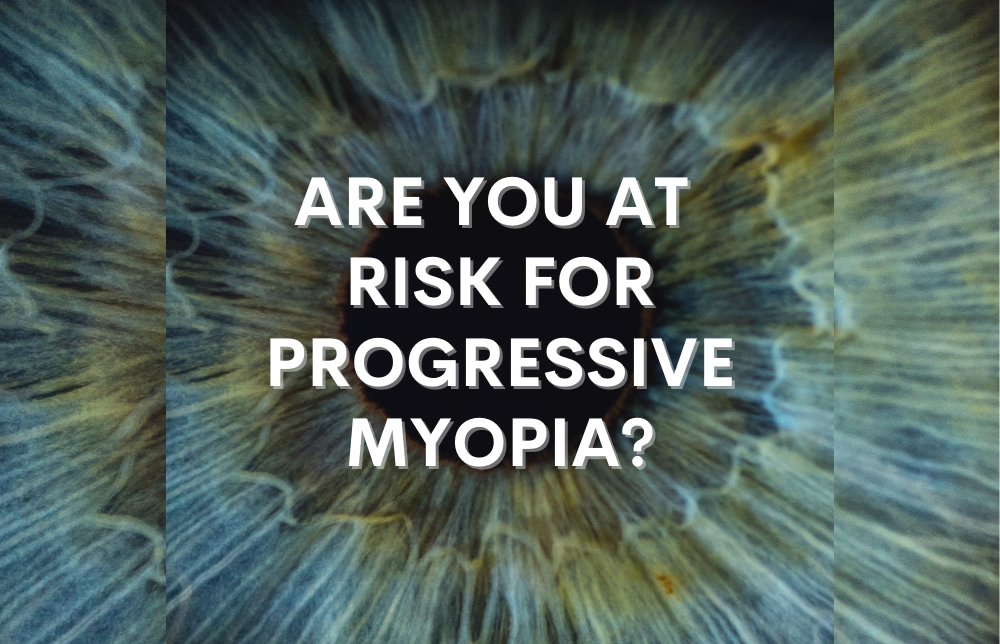
The Number of People Suffering from Progressive Myopia Is Rising. Are You at Risk?
July 26, 2022
Progressive myopia is nearsightedness that gets worse year after year. If left untreated, progressive myopia can result in “high myopia”, a type of nearsightedness that increases the risk of many serious eye conditions.
What is Progressive Myopia?
For many people, myopia’s onset usually occurs during childhood and adolescence. Myopia can continue to progress into early adulthood. Progressive myopia is often caused when an eyeball shape continues to elongate from front to back over time.
The number of people diagnosed with progressive myopia is increasing at an alarming rate. In 2015, 2.7% of the population were diagnosed with high myopia. By 2050, it is estimated that percentage will rise to 10% — nearly quadrupling in only 35 years.
It is still not fully understood why some nearsighted individuals develop progressive myopia and others do not. However, there are several factors that can cause the condition, including:
- Hereditary Children with a severely nearsighted parent/parents have a higher risk.
- Not enough time outdoors Researchers have found that spending 10-14 hours a week outdoors seems to reduce the risk of myopia.
- Too much time reading up close Studies aren’t yet conclusive, but many have found that spending less time on computers and smartphones, not holding reading material too close and taking visual breaks can help prevent progressive myopia.
Potential Complications of Progressive Myopia
People with progressive myopia are at a higher risk of developing certain eye conditions associated with the elongation of the eye and stretching of the retina. If these conditions develop and are left untreated, they can threaten part or all of your vision.
People with progressive myopia have a higher chance of developing:
Glaucoma causes damage to the optic nerves, the pathways between the eyes and the brain. Noticeable symptoms such as blurred vision, headaches, difficulty seeing in the dark and loss of peripheral vision don’t occur until the condition is advanced.
People with progressive and high myopia have a greater risk of developing cataracts. Symptoms include blurred vision, hazy vision, halos around lights, and reduced vibrancy of colors.
Retinal detachment risk is about 5-6 times greater for those with progressive myopia. This is because elongation of the eye causes stretching and thinning of the retina, which can result in rips in the peripheral retina and detachment of retinal tissue from the underlying layers of the eye’s interior.
Like retinal detachment, myopic macular degeneration also happens because of retinal stretching and thinning. It can affect how well you’re able to see objects and colors in the center portion of your vision.
Even if you aren’t experiencing any of these symptoms, regular eye exams are a must to maintain healthy vision. The Vision Plan from MRTA and AMBA provides quality coverage with low copays for services you need, including a covered Well Vision exam every 12 months. Sign up now at www.AMBAdentalvision.com or call 866-979-0497.
Source: https://www.who.int/news/item/08-10-2019-who-launches-first-world-report-on-vision
RECENT POSTS

An Ambulance Trip Is Stressful: With MASA, the Cost Doesn’t Have to Be
People who require an emergency ambulance trip frequently ask the same question upon receiving the bill: “Why was the
Read More

AMBA’s Essential Insights in Dental Health: Understanding Cavities
Have you ever experienced pain or noticed persistent sensitivity in your teeth? You might have a cavity. Cavities are common,
Read More

Smart Holiday Season Safety Tips for Travelers
Whether to get together with loved ones or to get away from it all, people love to travel during the holiday season. In fact,
Read More

Play the Long Game: 5 Important Reasons to Purchase Long-Term Care Insurance
When it comes to your health, it’s essential to plan for the unexpected. While this is important at any age, it's
Read More

